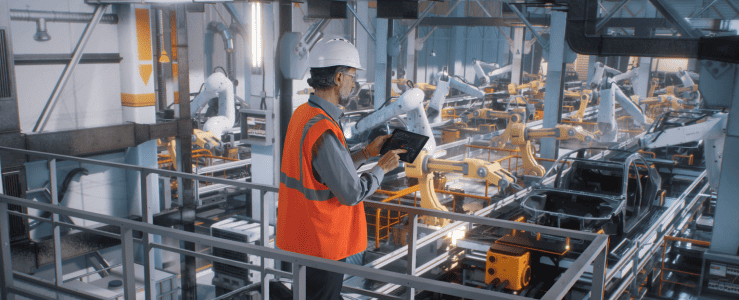Blog

Building Systems for Scalability in the Manufacturing Industry
Adaptable systems and integrations are the keys to total operational scalability for manufacturers
A scalable system has the ability to easily accommodate changes in sales and processes. In the manufacturing industry, scalable production is the only way to remain profitable and scalable systems are the only way to adjust to dramatic changes in demand and availability.
Being able to meet demand without sacrificing performance or service is imperative to future development. In order to create effective solutions, you must first understand where scalability will impact your business the most and then implement systems accordingly. Let’s take a look at why scalability in manufacturing matters and how using adaptable ERP and CRM systems can benefit your business.
Why scalability matters
Sometimes change is anticipated, and other times factors completely outside of a business’ control can impact operations. Having scalable solutions across the board from the production line to customer service allows companies to adapt to any situation.
Consider the following scenarios and how important scalability is in each one:
- The newest product takes off much faster than anticipated. Demand is through the roof, and sales are 10-times higher than the second most popular product.
- The Kickstarter campaign for a start-up’s first product surpasses its goal in record time, leaving thousands of people waiting to get their hands on it. The company must go from almost zero production to thousands of units as quickly as possible.
- A disaster strikes, and there is a unique niche for a product that can save people’s lives. The lives and health of people are waiting on the business to meet demand.
- A defect in a product leads to several injuries, bad press, and the eventual discontinuation of that product. The business has to ramp down production instantly to save money and survive.
In each of these cases, not only is it important to have a scalable production solution to meet demand and get products into the hands of customers, but it’s also important to have the systems in place to handle sudden surges of information.
Adaptable ERP and CRM systems
Rapid growth can be damaging for businesses that aren’t ready to handle it. In addition to the factory being able to keep up with demand, consider whether your systems and processes are ready for a surge in customer records, pricing complexities, suppliers and dealers, orders, and service inquiries.
Having scalable ERP and CRM systems gives a business the power it needs to handle more data and manage more resources. This includes the amount of data stored in the system, the number of users accessing that data, and the rate at which the system is processing orders and invoices.
Scalable systems should be able to handle a surge in orders and the creation of new accounts. They should also give users access to real-time data for rapid decision making and the mobility to be used anywhere, which is why cloud-based solutions are usually the best bet.
One of the biggest challenges of managing any on-site technology is trying to predict future usage. Misjudging your needs and can lead to tremendous waste. Cloud services like those from Microsoft, Google, Amazon, or SAP offer the flexibility many manufacturers need from an ERP system. A cloud-based ERP takes the guesswork out of storage capacity, security, and bandwidth usage. Businesses can simply add to or subtract from their plan to support the load they need.
Integrate for scalability
To truly optimize scalability, your ERP system needs to integrate with other key applications, such as your CRM. Without integration, you may find yourself drowning under the volume of manual work that’s required to handle your new transaction load while maintaining separate pricing, inventory, and customer records. This leads to inaccurate data and bottlenecks as employees don’t have access to the information they need.
Integrated systems allow departments to grow together. Sales can keep up with surges in demand by having access to real-time data on pricing and inventory. Customer service can offer better experiences with instant access to the most recent customer records and order history from the ERP system of record. Finance can process information faster by having access to orders and invoices. And operations can adjust quickly by having access to sales performance records.
enosix takes the complexity out of your ERP integrations so you can move at the speed of your customers and scale up with growth. Our bi-directional integration solution delivers real-time connections between SAP and your front-end systems so everyone has access to the information and tools they need without middleware or coding.
enosix is built to seamlessly scale right along with your front-end systems and SAP ERP core. Our proprietary framework unlocks SAP data and optimizes business processes in a new way. This isn’t just a patch or a temporary solution, enosix is a standardized platform you can build on as you grow your business.Schedule a free demo with us today to learn more.


